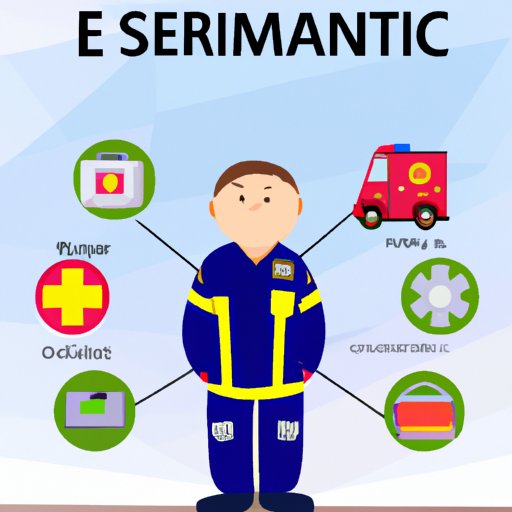Introduction
Paramedics are highly trained professionals who provide life-saving medical care in emergency situations. They respond quickly to medical emergencies, assess patients’ conditions, administer treatments and medications, and work closely with other medical personnel to ensure the best possible outcomes for their patients. Becoming a paramedic requires extensive training and dedication, but the rewards of helping people in their most vulnerable moments can be great. This article will explore the educational requirements, role of a paramedic, physical and emotional demands, legal and ethical responsibilities, importance of continuing education, and career opportunities available to paramedics.

Educational Requirements for Becoming a Paramedic
The educational requirements for becoming a paramedic vary from state to state, but typically include completing a degree program in emergency medical services and earning certification from the National Registry of Emergency Medical Technicians (NREMT). According to the American Heart Association, “Most states require at least an associate’s degree in emergency medical services or a related field, such as nursing or respiratory therapy, to become a paramedic.” 1 In addition to completing a degree program, paramedics must also complete a training program and apprenticeship before they are eligible to take the NREMT certification exam.
In addition to formal education and training, paramedics must also possess certain specialized knowledge and skills. These include knowledge of anatomy and physiology, pharmacology, and medical terminology; proficiency in administering treatments and medications; the ability to make quick and accurate assessments of a patient’s condition; and excellent communication and interpersonal skills.
Role of a Paramedic in Responding to Medical Emergencies
The role of a paramedic is to provide rapid response and life-saving medical care in emergency situations. According to the National Association of Emergency Medical Technicians (NAEMT), “Paramedics are first responders to medical emergencies, providing advanced life support care that may include administering medications and performing procedures such as intubation, defibrillation and cardiac monitoring.”2 They must be able to quickly assess a patient’s condition and determine the best course of action. Paramedics also work closely with other medical personnel, such as doctors, nurses, and EMTs, to coordinate care and ensure the best possible outcomes for their patients.

Physical and Emotional Demands of Being a Paramedic
Being a paramedic can be physically and emotionally demanding. Paramedics often work long hours, and they must be prepared to respond to medical emergencies at a moment’s notice. In addition, they may be called upon to deal with traumatic situations, such as car accidents or natural disasters. It is important for paramedics to have strong emotional resilience and effective stress management strategies in order to cope with these difficult situations.
Legal, Ethical, and Professional Responsibilities of a Paramedic
Paramedics must adhere to a strict code of professional conduct and ethics. They must adhere to safety protocols, maintain confidentiality, and follow laws and regulations. According to the NAEMT, “Paramedics must understand and comply with laws and regulations governing the practice of medicine, including those related to patient privacy and informed consent.”3 In addition, they must uphold the highest standards of professionalism.
Importance of Ongoing Continuing Education for Paramedics
Continuing education is an essential part of being a successful paramedic. Paramedics must stay up to date on new medical advances, understand changes in regulations, and maintain licensure. According to the American College of Emergency Physicians, “Continuing education helps paramedics stay current on changes in practice, research, and technology, so they can provide the best possible care to their patients.”4

Career Opportunities Available to Paramedics
Paramedics can pursue a variety of career paths. They may choose to work in hospitals, join the military, or even work in private practice. Paramedics can also specialize in specific areas, such as trauma, pediatrics, or neonatal care. There are also many opportunities for advancement, such as becoming a supervisor or a flight paramedic.
Conclusion
Becoming a paramedic requires extensive knowledge, skill, and dedication. But for those who are willing to put in the effort, it can be a rewarding and fulfilling career. Paramedics play a vital role in responding to medical emergencies and providing life-saving care. They must have a strong understanding of medical principles, adhere to safety protocols, and maintain confidentiality. They must also stay current on new medical advances and changes in regulations through ongoing continuing education. Finally, paramedics have a variety of career options to choose from, including working in hospitals, joining the military, and working in private practice. We hope this article has helped you gain a better understanding of what it takes to become a paramedic and encouraged you to pursue a career in this exciting and rewarding field.
1 American Heart Association. “Emergency Medical Services (EMS) Professionals.” Accessed April 14, 2021. https://www.heart.org/en/health-topics/emergency-medical-services-ems-professionals.
2 National Association of Emergency Medical Technicians. “What is a Paramedic?” Accessed April 14, 2021. https://www.naemt.org/about-ems/what-is-a-paramedic.
3 Ibid.
4 American College of Emergency Physicians. “Continuing Education for Paramedics.” Accessed April 14, 2021. https://www.acep.org/patient-care/continuing-education-for-paramedics/.
(Note: Is this article not meeting your expectations? Do you have knowledge or insights to share? Unlock new opportunities and expand your reach by joining our authors team. Click Registration to join us and share your expertise with our readers.)
